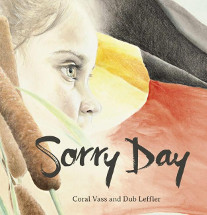Sorry Day by Coral Vass and Dub Lefler

NLA Publishing, 2018. ISBN 9780642279033
(Age: 6+) Highly recommended. Themes: Aboriginal themes, Sorry Day,
Aboriginal history, Reconciliation, Apology, Kevin Rudd. Two stories
coincide in this beautifully illustrated picture book telling of
National Sorry Day celebrated on May 26. The momentous day of
February 13, 2008 is the setting of this tale as Maggie and her
mother stand amongst the crowd eagerly waiting for Prime Minister
Kevin Rudd to say sorry to Aboriginal families for what was done to
them in the twentieth century taking away their children as a matter
of government policy.
In the crowd Maggie loses sight of her mother, and in this way the
book parallels the plight of those children forcibly removed. But
all is well for Maggie and she is restored to her mother, just in
time to hear the Prime Minister utter the words that so many have
longed to hear for generations.
This is a deceptively simple story, sparsely told, one that shadows
the Stolen Generation in its words and illustrations. Without over
telling the tale, students are acquainted with the bare bones: that
children were taken - enough to ignite many discussions and stories
in the classroom as part of the Australian Curriculum.
The illustrations accompanying the text parallel the words with
subtle sincerity. The sepia wash double pages show what happened in
the past, reflecting the lifestyle of the groups living in fear of
the men in authority coming for their children. In between these
pages subdued colours show Maggie and her mother waiting in the
crowd, excited by the momentous happenings on that day.
Each double page reflects the difference between Maggie and her
mother celebrating with their families and the children of the past
being taken. One page has legs hiding Maggie as she loses sight of
mum, while the next shows the legs of the authorities rounding up
the children. Readers will enjoy recognising these parallels and
marvel at the skill of the illustrator, Dub Leffler, a descendant of
the people of south west Queensland, the Bigambul and the
Mandambarji, underscoring the events of each day
With a foreword by Lee Joachim, Chair of Rumablara Aboriginal
Cooperative, a double page spread giving an outline of Sorry Day and
its history, and photos on the last pages, the book offers an
insight into the celebration of Sorry Day and why it was
established, making it a must read for any library and classroom to
initiate discussion, inform, delight and educate.
The front cover is stunning, with the colours of the Aboriginal flag
subtly forming the background, the young girl focussed on looking
ahead and the grasses in one corner offering a link to the past, and
I love the fold out page towards the end where all the themes come
together, everyone looking forward together. Teacher
notes are available on the NLA website.
Fran Knight